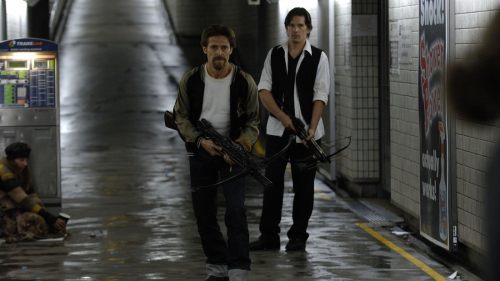THE HUNGER GAMES: CATCHING FIRE Movie Review: A Subversive, Exciting SciFi Epic
From the outside The Hunger Games: Catching Fire looks like a rehash of the first film. Once again Katniss Everdeen and Peeta Mallark are thrown into the Arena, ordered to fight to the death against 22 other opponents on live television as part of the way the Capital keeps the outlying, ever-rebellious Districts in line. But the brilliance of Catching Fire’s structure is that while some of the beats remain the same the context is ingeniously changed; things sound similar on paper but feel completely different as they play out on screen.
The movie opens some time after the events of The Hunger Games. Katniss has returned to District 12, where she still illegally hunts with the hunky Gale, but this time she brings a dose of PTSD with her into the woods. While her victory in the Arena was based on pretending to love Peeta, she can’t even look the kid in the eyes back home. They live across the street from each other in Victor’s Village, an empty, foreboding gated community set away from the hardscrabble miners of the District. In winning they have lost everything that connected them to their own people.
One of the duties of a Hunger Games victor is to take the Victory Tour, to hit each of the 12 Districts and show the poor and hungry people the largesse of the Capital - and also to remind them of the power of President Snow. But this Victory Tour is unique because President Snow understands that Katniss has become a symbol of resistance against the Capital. He warns her that her job is to play nice and subservient to the Powers that Be, or else there will be payback. Perhaps he can’t kill her, a media darling, but everyone she loves is fair game.
The problem is that Katniss doesn’t know how to play nice. Sullen and cursed with an instinct for knee-jerk rebellion, the girl can’t quite play the part - although she tries, especially after seeing how brutally the people of District 11, home of her dead friend Reu, are treated when they offer her the three-fingered salute of the revolution. And so President Snow takes drastic action, changing the Hunger Games for the upcoming 75th iteration - this time the players will come from the pool of living victors. And since Katniss is the only surviving female victor of District 12, she’s guaranteed to play.
That’s a lot of plot summary for a review, but it’s all vital to understand the way that the script by Simon Beaufoy and Michael Arndt, from the novel by Suzanne Collins, sets up the stakes of this dystopian sequel. While the first film was an admirable jab at the way rulers from Augustus to Obama have distracted the ruled with bread and circuses, Catching Fire goes much deeper. This time the focus is on subversion, and how it can be accomplished. Katniss’ victory has changed everything in a profound way, and even characters who were oblivious members of the aristocracy, like Effie Trinket (Elizabeth Banks), have been awoken to the injustice of the world around them and have begun to take action.
If The Hunger Games was about realizing the ways in which we are kept down, Catching Fire is a manual for standing up. It advocates a within-the-system rebellion, using the media machine against its operators. In the first film Cinna (Lenny Kravitz), the stylist, won the crowds with his designs. This time he agitates the crowds with his designs, sending a subtle message to those who know what he’s saying. Again and again the characters use the mechanisms of control to subvert the controllers, not unlike the events in Chile in 1988, when an ad executive used his media savvy to wage a media campaign against dictator Augusto Pinochet (see the 2012 movie NO for more on that), or the ways that Yippie! co-founder Abbie Hoffman turned the establishment-oriented evening news against the establishment. There are people fighting in the street - we see this played out from a distance - but Catching Fire is aimed at audiences who have been mollified by the media - people living in the Capital, as we all do - and yet want to make a difference. The film is telling them how to do it.
What's more, the film's tagline - "Remember who the enemy is," a line spoken by Haymitch (Woody Harrelson) - is a sword that cuts through all the bullshit of the modern world. In the Hunger Games the Capital pits tributes from the 12 remaining Districts against each other, keeping the oppressed people too busy fighting amongst themselves to organize against the overlords. This isn't just a fictional conceit; we live in a world where the rich and powerful use the media to keep the poor and underclass at each others' throats, divided by false racial lines or cultural boundaries. We see this happening around us as dirt poor Tea Party members complain about dirt poor urban mothers getting welfare while ignoring the way their tax dollars subsidize corporate earnings. We are entertained and mollified by the Hunger Games, but at the same time we are distracted and divided by them.
The politics of Catching Fire play against stakes that are more personal and emotional than in The Hunger Games. Katniss and Peeta must continue to pretend to be in love, but it’s hard for her to be in such constant, close proximity to him and not feel something for the boy who basically comes from District Friendzone. The relationships between the players in the games this time are more complex; all veterans, none are happy to be back in the Arena. I thought I knew how this would play out, but the story surprised me at every turn - not only is Catching Fire subversive politically, it’s subversive in storytelling.
The games take on a new weight now that we’ve seen them before. Training is a more fatalistic experience, and the actual game carries the weight of impending doom. There’s no way both Katniss and Peeta can make it out again, after all. But the sense of doom doesn’t make Catching Fire some sort of grimdark chore; it actually allows the characters to stand up as heroes, people who see looming defeat and yet refuse to back down. That’s the true revolutionary spirit, to see that you are outnumbered and outmaneuvered by a bigger, more capable enemy and yet never give up. Some revolutionaries make it to the end of the revolution, but it could be argued that the most valuable revolutionaries are those willing to die in the early days, providing the impetus for others to become radicalized. That’s a lot of big thought for a movie based on a Young Adult trilogy, but it’s in the film.
Jennifer Lawrence captivates again as Katniss. It’s not hard to see Kat’s discomfort with the Victory Tour as a mirror of Lawrence’s own dislike of press tours, and that adds a level of resonance to it all. Katniss is reluctant in many ways, but she’s brave and proactive the rest of the time. What I love about her in this film is that she is just as comfortable in Senna’s frilly dresses as she is in the spandex of her Arena uniform; she understands how both are tools for getting the job done.
She’s surrounded by new tributes this time out; Finnick Odair is the one with the most screentime, and he’s introduced in an intriguingly schizophrenic way. We first meet him topless, grossly hitting on Kat. He’s an ego-driven winner, a media darling whose exploits are the constant talk of the Capital. He doesn’t spend money anymore; it’s implied he trades in sexual favors for all his needs. But once he’s in the Arena we see that he is a loving caretaker for Mags (Lynn Cohen, who played Golda Meier in Munich), the oldest tribute. Frail and mute, she rides Finnick’s back through the jungle.
Sam Claflin is Finnick; he’s one of those guys who’s always getting rumored as being in the running for all the big roles, the constant Next Big Thing. I get it after this film; he has a small, pursed mouth that can be prickish but that can also split his face into a magnanimous smile. In the film he keeps you constantly wondering, unsure just what game he’s playing - and yet you always like him. Obviously the Mags stuff is a bit of a cheat - you’re going to like the guy who is running around with the old lady on his back - but Claflin plays Finnick with enough mystery that I was never certain if his love for Mags was a sign of his decency or an indication of the one human part of a villain.
Another new tribute is Johanna Mason, introduced as aggressive to the point of crazy when she strips naked in an elevator possibly trying to seduce Peeta. It’s a role that Jena Malone was born to play, a wild child with electric intelligence who can’t quite keep down her rougher instincts. She’s sexy and almost inscrutable in her intentions; like Finnick, Johanna keeps you guessing right until the end of the film.
Outside of the Arena a new Games Master is in charge, Plutarch Heavensbee. Philip Seymour Hoffman embodies the aristocratic class that turns indolence and gluttony into a lifestyle. Heavensbee is more in charge that Seneca Crane ever was, and he stands toe to toe with Donald Sutherland’s President Snow, who seems very aware that his society is at a crossroads. Heavensbee is the soft face of the Capital, everything that allows the dictatorial system to continue. Hoffman is marvelous in the role.
And then there’s Peeta. It’s tough to fault Josh Hutcherson for his performance in a role that’s just this side of mewling; Peeta is a beta male through and through, pining for Katniss endlessly while she’s off in the woods making out with Gale. His persistence wears her down on the road, but to me Peeta represents everything that’s wrong with society - he’s the guy who won’t fight, but who will just try and wait everything out. Hutcherson, so much smaller than Lawrence, sells it. Unfortunately I don’t like what he’s selling; if there’s supposed to be a love triangle at play here I’m not fully invested in it.
On any side. Liam Hemsworth has more to do as Gale this go-round, but his character still doesn’t floor me. He has a masculinity and a commitment to revolution that appeals, but otherwise he’s empty. It’s strange in American populist cinema to see a movie where the male love interests are half-filled, serving largely as reflectors for the internal struggle of the heroine - but it’s also refreshing. Katniss is one of the most engaging, exciting heroes in pop culture today, of whatever gender.
When Francis Lawrence was announced for the film I was concerned; his filmography elicits no confidence. His movies are serviceable at best, terrible at worst, and I liked the rough-edged quality Gary Ross brought to the first film. Lawrence surprised me in a big way, though; he kept the harder edged qualities that Ross laid down but has made a more polished film. Those who complained about shaky cam in The Hunger Games will find the camera more steady, and those who chafed at the obvious budgetary limits will find that Francis Lawrence had more money to work with. It makes a difference - Lawrences’s staging of the entrance of the tributes is grand, while Ross’ was stilted and small. It’s almost like Panem got more majestic between films.
Lawrence’s reliance on CGI is almost missing this time out - except for an unfortunately extended baboon attack sequence, which just doesn’t work. It’s too long and it’s too silly, completely undermining the stakes that had been established at that point. I’m sure it’s faithful to the book, but that isn’t always the arbiter of what belongs in a movie.
But the next two films (the third book has been cleaved in half for the movies) are in good hands; Lawrence’s direction has scope as well as intimacy, and his action is well-directed. This film feels far more brutal than The Hunger Games; now that the tributes are adults we can see more violence and bloodshed onscreen. And I suspect that, based on the exciting cliffhanger ending of this film, Mockingjay is just going to keep upping the ante.
I really liked The Hunger Games, but Catching Fire bests it in every way. If this trend continues this series will be a political science fiction epic that will endure for generations.



